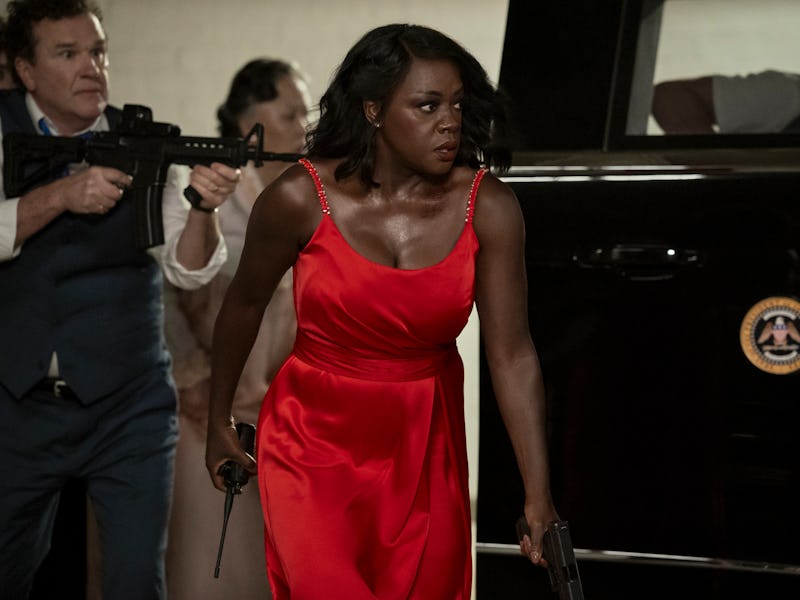G20 Makes The Most Of A Formulaic Political Thriller
The Die Hard remix isn’t the action vehicle it could have been, but it’s a lot of fun regardless.

Viola Davis spent the better part of a decade trying to convince the world that she was capable of leading an action film. It shouldn’t have been that difficult to sell her for anything: she’s one of the most decorated actors of her generation, and one of a handful to achieve EGOT status. But changing the way that Black women — dark-skinned Black women and Black women over 40 in particular — are depicted in big Hollywood blockbusters is akin to a Sisyphean task. Even after headlining the subversive Widows, bringing DC’s Amanda Waller into live-action, and championing one of the best actioners of the decade in The Woman King, Davis is still pushing the boulder up that hill. But the struggle isn’t always a struggle: sometimes, it gives us something fun and light like G20, a film that, however messy or misguided, still brings us that much closer to the norm Davis has worked so hard to manifest.
Davis’ latest foray into action has a lot more in common with White House Down than The Woman King. G20 feels like an offering from the alternate universe where Kamala Harris won the U.S. presidency: the allusions to the world we could have had are there for those with eyes to see, but this world is still a ways away from feminist utopia. Davis’ Danielle Sutton is a better POTUS than anyone deserves, a war hero made famous on the cover of TIME, and a mother working hard to raise her two kids. But any way you slice it, she’s got a thankless job. Her headstrong, tech-savvy daughter Serena (Marsai Martin) is constantly undermining her authority, and every day, Sutton has to navigate new doubts about her capabilities as president.
Save for her loving husband Derek (Anthony Anderson, playing it straight for once), her devoted bodyguard Manny (Ramón Rodríguez, with whom Davis has infinitely more chemistry), and her Treasury Secretary (Elizabeth Marvel), no one respects Sutton’s attempts to actually change the world for the better. Still, that’s not stopping her from trying to solve world hunger, even if her strategy has more than a few holes in it. Her latest proposition, the “Together Plan,” will somehow use cryptocurrency to bolster the lives of working-class farmers around the world. The longer you think about this strategy, the less sense it actually makes — but in this universe, it’s a viable answer to a global issue, and Sutton intends to get other world leaders to agree at the upcoming G20 Summit in Cape Town, South Africa.
As with our own universe, Sutton’s plan is soon threatened by a blonde menace obsessed with money and supremacy. That he just so happens to be played by Antony Starr (who became the defining villain of our era for playing a supe-ified Trump on The Boys) is just a happy coincidence, but it’s one that makes G20 a much better film than it could have been. Starr is just as compelling as he’s always been, even if his Rutledge is a stock villain plucked straight out of the ‘90s. He’s an ex-military savant with a chip on his shoulder, determined to destroy the world and avenge a tragedy from his past. While Sutton wants to use crypto to spread the wealth, Rutledge wants to crash the global economy and get rich doing it. G20 spends a lot of time explaining the intricacies of his plan for the financially disinclined (it has something to do with stocks, deepfake, and AI), but it all begins when he storms the titular event and takes its high-value guests hostage.
The Boys’ Antony Starr makes the best of a cliched villain role.
Sutton, girlboss that she is, manages to escape the melee with Manny, the British prime minister (Douglas Hodge), the First Lady of South Korea (MeeWha Alana Lee), and the head of the IMF (Sabrina Impacciatore). This unlikely group — alongside Sutton’s husband, kids, and two hypercapable hotel staffers (Theo Bongani Ndyalvane and Noxolo Dlamini) — becomes the last line of defense against Rutledge’s insurrection. If this sounds like a lot to keep track of, that’s because it definitely is, and G20 doesn’t stop here. The film packs even more subplots into its 100-minute runtime: for every scene where our heroes overexplain their escape plot, there’s one that checks in with Sutton’s vice president (Clark Gregg) as he watches the chaos unfold from Washington, D.C. All this exposition doesn’t leave a lot of room for action — though when the film does give Davis, Rodríguez, or Starr the space to get physical, all its moving pieces find some much-needed synergy.
G20 is tackling some of the bleaker hot topics of the decade, but the film, against all odds, refuses to fall prey to cynicism. Its optimism lends it the kind of charm that usually escapes political thrillers altogether: its script, penned at turns by four screenwriters, finds nuance in its feminist conceit, while its majority-female cast turns what could have been caricatures into living, breathing, endearing heroines. Its South African setting also infuses a new perspective to your garden variety Die Hard remix. Davis isn’t the only Black character who gets to save the day with dignity, and for all G20’s flaws, it does deserve credit for prioritizing that.